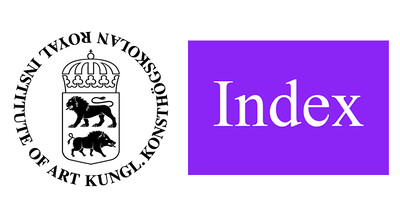Artistic Research in Focus at Index Foundation in Collaboration with Royal Institute of Art, Stockholm.
During autumn 2022, Index Foundation, together with the Royal Institute of Art in Stockholm, hosts three situations presenting artistic research projects being conducted at the school: Melanie Gilligan, Films Against Capitalism; Annika Larsson, Non-Knowledge, Laughter & The Moving Image; and Kajsa Dahlberg, The Tidal Zone.
Petra Bauer, Head of Department for Research and Further Education in Architecture and Fine Art, describes: “Artistic research allows us to, at the same time, explore materialities and the role of imagination in deepening our knowledge and finding new approaches to the world. In the three research projects, it is specifically the role of moving images in creating alternative imaginaries that is in focus.”
Index maintains close dialogues with academic institutions in Sweden and internationally to develop ways in which research can be exhibited. Director of Index, Marti Manen states: “Artistic research questions temporalities, assumed narratives and ways of doing. Art institutions are spaces for experimentation, freedom of expression and sharing knowledge. A collective and generous dialogue between academia and art institutions is more than necessary in our present times.”
In the exhibition, Films Against Capitalism, (November 3–13), Melanie Gilligan presents six video projects including sculptural video works, that comprise her doctoral research: The Common Sense, Parts-wholes, The Bay Area Protests, Crowds, Home Together and Health as Individual vs. Health as Social. In her video works, Gilligan brings attention to often neglected effects of capitalism on people who are marginalized such as labourers working on low-incomes and older people, as well as to political conditions such as police and state violence. Through the process of making the films, Gilligan maps how her practice changes over time, replacing a closed-set approach (The Common Sense) with mixing fiction and documentary to reflect everyday political settings (Crowds); this allows for a more direct focus on economic and social systems. Melanie Gilligan is a PhD candidate at the Royal Institute of Art in collaboration with Lund University and Stockholm University of the Arts. The public defense will be held 9 November at the Royal Institute of Art.
Annika Larsson presents at Index a two-day seminar, Non-Knowledge, Laughter & The Moving Image (November 15–16), examining the moving image and the (human and non-human) laughing body’s potential to overturn our habitual course and change the dominant order of things. Larsson uses laughter as an example, how it can suddenly invade a moment and set one off course. The project explores ways in which we, organisms, bodies, technologies and environments, communicate beyond instrumental language, subjectivity and reason, in order to demonstrate what moving images and bodies can do and how they can teach us about the limits of our thinking. Annika Larsson’s artistic research project is funded by the Swedish Research Council and done in collaboration with Royal Institute of Art and HFBK Hamburg.
Kajsa Dahlberg presents recent works in the exhibition, The Tidal Zone (November 23–January 29, 2023). Her practice-based research investigates film as an apparatus intertwined with non-human modes of life, specifically looking at the relationships between seaweed and the history of photography. Across the four works in the exhibition, Dahlberg evokes, among others, Jean Epstein and Ulla Ryum in order to engage with film as an intertidal media with capacities to hold a reciprocal relationship to the world—of being in touch. As in shapeshifting, this comes to also include the ways in which our bodies become registers of the environment. In what instances do our intensities and sensitivities become strengths that help us to see the world as habitable and animate? Kajsa Dahlberg is a PhD candidate at the Royal Institute of Art in collaboration with Lund University.
Royal Institute of Art has educated artists and architects since 1735. It is Sweden’s largest higher education institution in Fine Art and Architecture on an artistic basis. The Royal Institute of Art provides education with its faculty of seminal artists, theoreticians and architects from Sweden and abroad, by virtue of which alumni and currently enrolled students receive acclaim nationally and internationally.
Index – The Swedish Contemporary Art Foundation has been a foundation for nearly 25 years, working with exhibitions, research processes and learning programs with the aim for continuous and experimental dialogues between the institution, artists and audiences.






